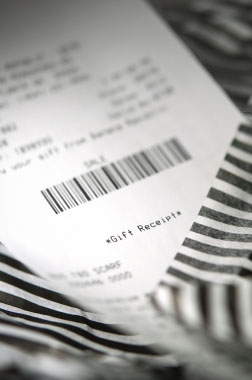Recently on a shopping excursion to ‘Urban Outfitters’ I was greeted with a question which was far from routine – “Would you like a paper receipt, or would you like your receipt to be e-mailed to you?”
Urban Outfitters, along with Sears, Apple, and Gap Inc., are just some of the many major retailers beginning to offer electronic versions of receipts, either e-mailed to the customer or uploaded to a password protected web page. If more stores continue to follow suit, paper receipts will be added to the increasingly long list of things the Internet has made almost obsolete: maps, bank statements, newspapers, CDs, and more.
Though consumers have become accustomed to these little slips, we often forget that we do not need the paper itself, but simply the information that is printed on it. Paper receipts cause unnecessary clutter, are annoying to keep track of, and most importantly, are detrimental to the environment. In addition to the obvious – trees being cut down, the type of paper used for receipts is heavily permeated with chemicals, usually making it impossible to be recycled. This means millions of pounds of paper are being fed into our landfills every year. In addition, the production of paper demands large quantities of resources, such as oil and water. And lets face it, paper receipts are often found years later in the strangest places, and baffled over long after their usefulness has expired.
While I feel the receipt is a relic of another age, I wanted to know if other Canadian consumers shared my vision of a ‘paperless receipt utopia’. Richard Anderson, 27, said of paper receipts: “I always say, ‘I will put this in a safe place.’ And I either never do, or it is not there when a product inevitably goes bust.” Most Canadians can relate, as it seems the only receipt you can ever find is never the one you actually need. Anderson went on to say, “There is sort of a disregard for modern life when the message is ‘whatever you do, don’t lose this tiny, tiny piece of paper.’”
Kayla Skarsgard, 24, stated, “Paper receipts are remnants of the past. I just bought a coffee and got a receipt – why would I need to return a coffee?”
Bram Wiseau, 48, was less than optimistic about the transition to e-receipts: “Paperless receipts are a nice idea, but, the receipt is a proof of purchase. What if you find the receipt was not properly e-mailed to you? Then what? Good luck trying to return your purchase!”
As I continued to speak with Canadian consumers, it became evident that everyone agreed both consumers and merchants alike need records of purchases. While most were in favour of e-receipts in theory, some were vary of privacy issues, such as their e-mail address being used for marketing or sold to a third party, or technological issues, such as the e-receipt never reaching their address. A large problem is also inertia – some people are accustomed to a tangible paper receipt and don’t want to change.
Evidently, there isn’t going to be a switch to paperless receipts overnight. Getting consumers and merchants alike to change their ways and embrace technology isn’t easy. But despite the roadblocks, transitioning to electronic receipts provides a win-win situation for merchants, consumers, and the environment alike. By being savvy consumers and letting retailers know what Canadians want, we can make a difference towards a more sustainable future.

